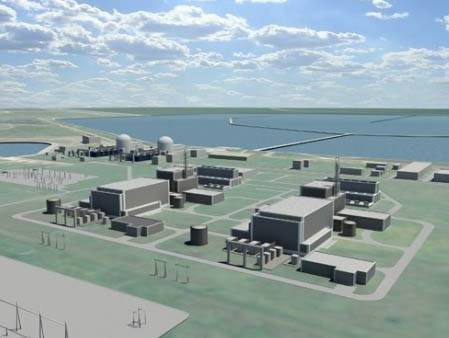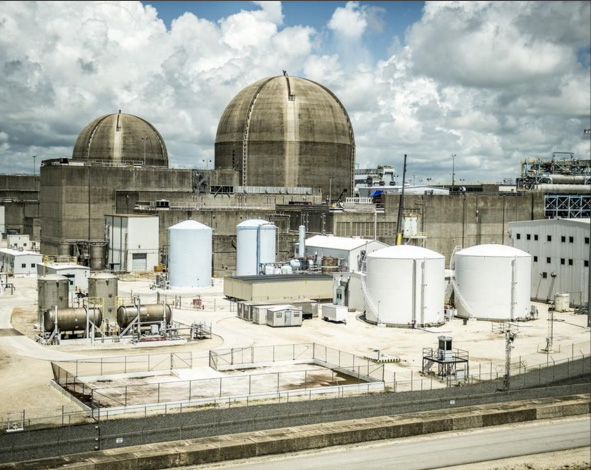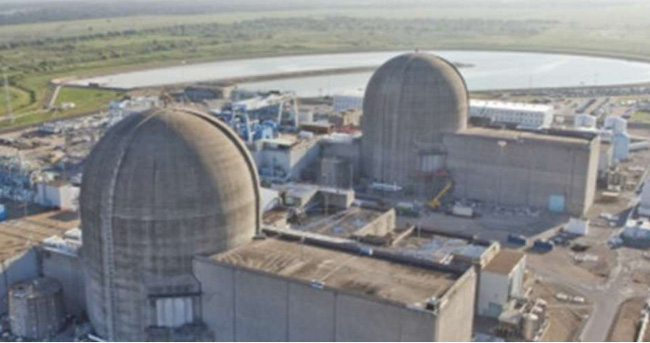Archive for the ‘South Texas Project’ Category
Toshiba scraps project to build ABWRs in Texas
31 May 2018
World Nuclear News
Japan’s Toshiba Corporation is to withdraw from the project to construct two of its advanced boiling water reactors (ABWRs) as units 3 and 4 of the South Texas Project (STP) in the USA. The company said the project, which has failed to find investors, is no longer financially viable.

An impression of how the two ABWRs would have appeared at STP (Image: STPNOC)
Toshiba – through its US-based wholly-owned subsidiary Toshiba America Nuclear Energy Corporation (TANE) – and US utility NRG Energy founded Nuclear Innovation North America (NINA) in 2008 to promote the use of Toshiba’s ABWR in North America. A combined construction and operating licence (COL) application for two ABWRs at STP, where NRG Energy already operates two pressurised water reactors, had already been submitted to the Nuclear Regulatory Commission (NRC) in 2007. In February 2009, TANE signed an engineering, procurement and construction (EPC) contract with STP Nuclear Operating Company, acting as an agent for NINA, and thereby became the main contractor for STP units 3 and 4. However, in 2011 NRG Energy announced that it would be withdrawing from the project and writing down its USD331 million investment in NINA. Since then, Toshiba has bankrolled the licensing process.
The NRC notified NINA in late 2011 that the corporation did not meet the foreign ownership requirements and would therefore be ineligible to receive a licence; however NINA subsequently filed revisions to its COL application and a "negation action plan" to address the issue. The NRC told NINA that it will continue to review the remaining portions of the COL application while the company "considers its options", but will not issue a licence until the foreign ownership requirements are met. The NRC Atomic Safety Licensing Board has since ruled that Toshiba’s formal 10% ownership of NINA was acceptable and the COLs for STP 3 and 4 were eventually granted in February 2016.
Toshiba announced today that its board had decided TANE will withdraw from the project. "Toshiba will proceed with the necessary procedures for the withdrawal with all related parties, and target its early completion," the company said. It expects to complete its withdrawal by the end of this year.
"The economic circumstances supporting the project have declined as a result of significant decreases in electricity rates due to the shale gas revolution, and the trend to tighter regulation of nuclear power plants in the aftermath of the Great East Japan Earthquake," Toshiba said. "Under current and expected economic conditions, further development of STP units 3 and 4 has ceased to be financially viable. In addition, maintaining the project incurs continuous costs, and no investors have expressed an interest in participation." It continued, "In these circumstances, there is no clear pathway to securing profitability and Toshiba has decided to completely withdraw from the project. The company has resolved to cancel all contracts related to NINA, the EPC contract and deferred loans, and to forgive loans under loan contracts."
Toshiba said its decision to exit the STP units 3 and 4 project is in line with its basic policy "to eliminate risk from the overseas nuclear power business, particularly from construction-related cost overruns in nuclear power plant construction projects, by withdrawing from projects where Toshiba Group serves as prime contractor or has to bear risk from construction-related cost overruns".
The company said that, as of today, it has claims of USD641 million and an equity interest of USD147 million in the US ABWR project. However, it noted that it recorded allowances for most of all bad debt and impairment loss by FY2017, which ended 31 March 2018, and the impact on business results in FY2018 "will be minimal".
Researched and written
by World Nuclear News
This document contains copyrighted material whose use has not been specifically authorized by the copyright owner. SEED Coalition is making this article available in our efforts to advance understanding of ecological sustainability, human rights, economic democracy and social justice issues. We believe that this constitutes a "fair use" of the copyrighted material as provided for in section 107 of the US Copyright Law. If you wish to use this copyrighted material for purposes of your own that go beyond "fair use", you must obtain permission from the copyright owner.
A Letter from Tim Powell: Toshiba withdraws from STP Units 3 and 4
06/07/2018
Bay City Sentinel
Toshiba Corporation announced May 31 that Toshiba America Nuclear Energy Corporation is withdrawing from the effort to build South Texas Project Units 3 and 4.
This decision was based on their belief that under expected economic conditions, further development of STP Units 3 and 4 has ceased to be financially viable.
In the coming weeks, we expect a meeting of NINA’s Board of Directors to determine the future of STP Units 3 and 4.
At STP, we want to thank the Community for their support of the effort to bring Units 3 and 4 to fruition.
Countless hours of hard work have been dedicated toward the development of Units 3 and 4. While we are disappointed to find ourselves in the position we are in today, I am proud of the work we’ve done, working together, to reach this goal.
While the further development of Units 3 and 4 are in question, I want to assure you that the safe and reliable operation of Units 1 and 2 remains the commitment of each and every employee at STP.
These units continue to be vital to the resilience and reliability of the Texas grid and we are focused on maintaining the exemplary performance we have achieved and creating further value for the community we call home.
Again, I want to express the appreciation STP has for this community, its leaders, and all of the incredible people who have offered their ongoing support to our mission.
With our recently granted 20-year life extension for Units 1 and 2, that mission will continue today, tomorrow and for many years to come.
STP remains a proud partner of Matagorda County and the South Texas region for over 30 years and will remain so as we continue to move forward.
Tim Powell
President and Chief Executive Officer
STP Nuclear Operating Company
This document contains copyrighted material whose use has not been specifically authorized by the copyright owner. SEED Coalition is making this article available in our efforts to advance understanding of ecological sustainability, human rights, economic democracy and social justice issues. We believe that this constitutes a "fair use" of the copyrighted material as provided for in section 107 of the US Copyright Law. If you wish to use this copyrighted material for purposes of your own that go beyond "fair use", you must obtain permission from the copyright owner.
Trumpf administration renews license of South Texas nuclear plant
September 29, 2017
By Sergio Chapa – Reporter
San Antonio Business Journal

The U.S. Nuclear Regulatory Commission has renewed the license for the South Texas Project. The nuclear power plant provides electricity to San Antonio, Austin and many other area communities.
In an order issued on Thursday, the NRC approved the South Texas Project to remain in operation for an additional 20 years.
Located just outside of Bay City and managed by the STP Nuclear Operating Co., the nuclear power plant is owned by Houston-based NRG Energy, San Antonio-based CPS Energy and Austin-based Austin Energy.
Originally built in the 1980s, the plant filed its application for a license renewal in October 2010. Operating under 40-year licenses, the plant’s two reactors were set to expire in 2027 and 2028 respectively. Under the 20-year renewals, the reactors are now cleared to operate through 2047 and 2048.
STP Nuclear Operating Co. President and CEO Dennis Koehl called the NRC’s decision a significant milestone for the plant.
"The license renewal of the South Texas Project is part of our ongoing commitment to provide Texans with safe, clean and reliable energy for decades to come," Koehl said in a statement.
Environmentalists opposed the renewal based on concerns over the handling of the plant’s radioactive waste, its potential vulnerability to hurricanes and market shifts that have made nuclear power more expensive than natural gas and renewables. The Bay City plant was able to keep producing power when Hurricane Harvey tore through the Texas Gulf Coast last month.
"I am proud of the dedication of our storm crew teammates," Koehl said. "Through great personal sacrifice, these individuals provided safe, reliable electricity to millions of Texans throughout Harvey."
The South Texas Project employs 1,200 people and is one of the newest and largest nuclear power facilities in the United States. Its two units produce 2,700 megawatts of electricity to an estimated 2 million homes.
NRC officials granted the South Texas Project a license in February 2016 license to add two more nuclear reactors at the site but they have yet to be built. Cheap natural gas has made building a new nuclear plant uneconomical, but plant operators told the Business Journal in a previous interview that they will be able to hold on to the license and build them when market conditions are right.
This document contains copyrighted material whose use has not been specifically authorized by the copyright owner. SEED Coalition is making this article available in our efforts to advance understanding of ecological sustainability, human rights, economic democracy and social justice issues. We believe that this constitutes a "fair use" of the copyrighted material as provided for in section 107 of the US Copyright Law. If you wish to use this copyrighted material for purposes of your own that go beyond "fair use", you must obtain permission from the copyright owner.
As Historic Flooding Grips Texas, Groups Demand Nuclear Plant Be Shut Down
Tuesday, August 29, 2017
Jon Queally, staff writer
Common Dreams
"This storm and flood is absolutely without precedent even before adding the possibility of a nuclear accident that could further imperil millions of people who are already battling for their lives."

The South Texas Project nuclear power facility in Bay City, Texas could be under extreme threat from historic flood waters, groups warned on Tuesday. (Photo: STP)
As record-breaking rainfall and unprecedented flooding continue to batter the greater Houston area and along the Gulf coast on Tuesday, energy watchdogs groups are warning of "a credible threat of a severe accident" at two nuclear reactors still operating at full capacity in nearby Bay City, Texas.
Three groups—Beyond Nuclear, South Texas Association for Responsible Energy, and the SEED Coalition—are calling for the immediate shutdown of the South Texas Project (STP) which sits behind an embankment they say could be overwhelmed by the raging flood waters and torrential rains caused by Hurricane Harvey.
"With anticipated flooding of the Colorado River, the nuclear reactors should be shut down now to ensure safety."
—Karen Hadden, SEED Coalition "Both the U.S. Nuclear Regulatory Commission and the STP operator have previously recognized a credible threat of a severe accident initiated by a breach of the embankment wall that surrounds the 7,000-acre reactor cooling water reservoir," said Paul Gunter, director of the Beyond Nuclear’s Reactor Oversight Project, in a statement by the coalition on Tuesday.
The groups warn that as Harvey—which on Tuesday was declared the most intense rain event in U.S. history—continues to dump water on the area, a breach of the embankment wall surrounding the twin reactors would create "an external flood potentially impacting the electrical supply from the switchyard to the reactor safety systems." In turn, the water has the potential to "cause high-energy electrical fires and other cascading events initiating a severe accident leading to core damage." Even worse, they added, "any significant loss of cooling water inventory in the Main Cooling Reservoir would reduce cooling capacity to the still operating reactors that could result in a meltdown."
With the nearby Colorado River already cresting at extremely high levels and flowing at 70 times the normal rate, Karen Hadden, director of SEED Coalition, warned that the continue rainfall might create flooding that could reach the reactors. "There is plenty of reserve capacity on our electric grid," she said, "so we don’t have to run the reactors in order to keep the lights on. With anticipated flooding of the Colorado River, the nuclear reactors should be shut down now to ensure safety."
Last week, the STP operators said that safety for their workers and local residents was their top concern, but that they would keep the plant operating despite the approaching storm.
Susan Dancer, president of the South Texas Association for Responsible Energy, said that as residents in Bay City—herself included—were being forced to leave their homes under manadatory evacaution orders, it makes no sense to keep the nuclear plant online.
"Our 911 system is down, no emergency services are available, and yet the nuclear reactors are still running. Where is the concern for employees and their families? Where is the concern for public safety? This is an outrageous and irresponsible decision," declared Dancer. "This storm and flood is absolutely without precedent even before adding the possibility of a nuclear accident that could further imperil millions of people who are already battling for their lives."
As Harvey hovers over the coastal region, heavy rains are expected to persist for days even as the storm system creeps toward to Louisiana in the east.
But no matter how remote the possibility, said Gunter, "it’s simply prudent that the operator put this reactor into its safest condition, cold shutdown."
This work is licensed under a Creative Commons Attribution-Share Alike 3.0 License
This document contains copyrighted material whose use has not been specifically authorized by the copyright owner. SEED Coalition is making this article available in our efforts to advance understanding of ecological sustainability, human rights, economic democracy and social justice issues. We believe that this constitutes a "fair use" of the copyrighted material as provided for in section 107 of the US Copyright Law. If you wish to use this copyrighted material for purposes of your own that go beyond "fair use", you must obtain permission from the copyright owner.
Toshiba writes down value of stake in Texas nuclear project
May 7, 2014
Reporting by Aaron Sheldrick
Reuters
May 7 (Reuters) – Toshiba Corp said on Wednesday it wrote down by more than $300 million the value of its stake in a company planning to extend a nuclear power plant in Texas, amid uncertainty over the award of licenses for reactors in the U.S.
Toshiba had only last month scored a victory in a dispute with the U.S. Nuclear Regulatory Commission over foreign ownership rules, when the watchdog’s judicial arm ruled in the Japanese company’s favour.
But the NRC also said it will not make any final reactor license decisions anywhere in the U.S. until late 2014 at the earliest due to issues surrounding the long-term storage of spent nuclear fuel.
Japan’s Fukushima nuclear disaster in 2011 has forced a reassessment of atomic power, and cheap shale gas and coal has led to the closure of several older plants in the U.S.
Nuclear Innovation North America, which is 90 percent owned by New Jersey-based NRG Energy Inc and 10 percent owned by Toshiba, wants to build two new reactors at the South Texas nuclear power plant.
"Toshiba has undertaken a conservative reassessment of asset value of Nuclear Innovation North America … and recognised an operating loss of 31 billion yen ($305 million)," the Japanese company said in a statement.
The South Texas plant has two 1,280-megawatt reactors. In 2007, the plant’s owners applied to the NRC to add two Toshiba 1,350 MW Advanced Boiling Water Reactors at a cost of at least $17 billion.
($1 = 101.5550 Japanese Yen) (Reporting by Aaron Sheldrick)
This document contains copyrighted material whose use has not been specifically authorized by the copyright owner. SEED Coalition is making this article available in our efforts to advance understanding of ecological sustainability, human rights, economic democracy and social justice issues. We believe that this constitutes a "fair use" of the copyrighted material as provided for in section 107 of the US Copyright Law. If you wish to use this copyrighted material for purposes of your own that go beyond "fair use", you must obtain permission from the copyright owner.


